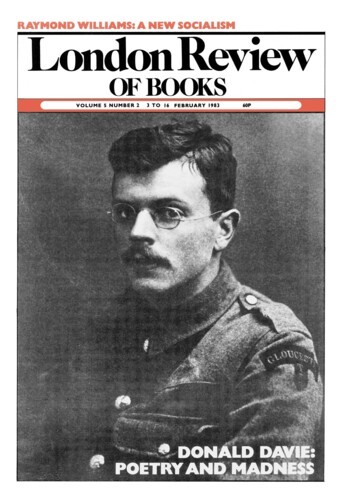When the publishers announced yet another book by Lord Denning, the fourth in three years, and one with the alarming title What next in the Law, I recall feeling a sense of foreboding: what next indeed? Recalled shortly after publication because of some unfortunate remarks about juries and the nature of society (subjects upon which judges, if one reflects on the matter, are not likely to be well-informed), What next in the Law is once more available, albeit with the naughty bits removed. The central theme of the book is law reform, and it is explained in the preface that Lord Denning has fallen to musing on the fate of shelved commission and committee reports. ‘So I thought: some spur is needed so as to get things done. Then I added, with undue presumption: My book shall be the spur.’ Some parts of his book are indeed devoted to such matters as the fate of the Pearson Commission Report on Civil Liability and Compensation for Personal Injury (1978), though I note with sadness, but without surprise, that no tears are shed for the Williams Committee Report on Obscenity and Film Censorship (1979), which was perhaps too liberal for Lord Denning’s taste. Much of the book, however, has little direct connection with the avowed aim of goading the mandarins into action, and I suspect that Lord Denning enjoys presenting his pensées to the British public, who, my informants in the publishing trade assure me, buy them like hot cakes. We have observations on the wearing of wigs (‘Some say it is out of date. Maybe it is’), on contingent fees (‘Never, never allow lawyers to work on the basis of a “contingency fee”’), on judicial attitudes to the European Convention on Human Rights (my favourite: ‘Sometimes we find it helpful. Sometimes not ... ’) and on a discriminatory Lloyds Bank Pension scheme (‘Its pension schemes were excellent’). There is also much history, presented in a chatty style uncomplicated by heavy scholarship. Indeed, to judge by his account of the death of Blackstone, Lord Denning appears to think study is positively dangerous:
He was not long on the Bench. He had studied too long. He took no exercise. He hated it. He ate too much. He got fatter and fatter. He died at the age of 57.
The vision of a golden past hangs over the book, as in this remarkable description of the English, which refers to some period between the Third Lateran Council (1215) and the 1950s, when they formed ‘one race’ and ‘shared the same standards of conduct, the same code of morals and the same religious beliefs. Above all they adhered uniformly to the rule of law.’ Tell that to the shades of Lord Mansfield, whose house the mob burnt during the Gordon riots, or to Thomas More as he went to the block. Critical comment on contemporary questions is presented ex cathedra, as in this extreme example: ‘It is sometimes suggested that instead of a jury of 12, there should be seven. I do not agree. There is something convincing about a verdict of 12 which is not the same with seven.’ So there!
What next in the Law is highly readable, often amusing and, as autobiography, very revealing. But the very virtues which ensure its success as a popular work – the pithy style, the oracular and egocentric presentation of arguments, the genius for simplification – are hard and perhaps impossible to marry to any serious discussion of such complex issues as civil liability without fault for motor accidents. Inevitably, the quest for striking brevity risks utter absurdity. The weird 11-line discussion of Watergate asserts that the principles applied by the US Supreme Court were those applied by Jacobean English Judges to James I – a novel interpretation indeed of English history and American constitutional law.
Plainly, Lord Denning’s tongue is often in his cheek, and I suspect his aim is to tease and provoke, so that his readers will think about the issues he presents – an aim in which he may well be successful, for he has the peculiar distinction of being able to persuade the lay public to read books about civil law. I have no idea whether he plans further contributions, but the best of Lord Denning is surely to be found not in such ephemeral works as this but in his judicial opinions, some of them classics of the genre. A short collection of these, with sufficient explanatory material to place them in context, might redress the unfortunate impression of naivety which is conveyed by What next in the Law.
Send Letters To:
The Editor
London Review of Books,
28 Little Russell Street
London, WC1A 2HN
letters@lrb.co.uk
Please include name, address, and a telephone number.

